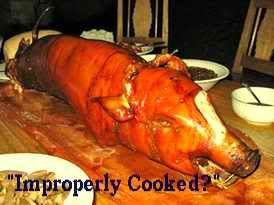A UP professor may soon turn out to be the biggest killjoy among lechon lovers.
For those foreign to Philippine culture, lechon is roasted pig cooked over blazing coals. It is a dish that is almost a fixed part and menu centerpiece of any Filipino celebration. If you want a more graphic illustration on cooking lechon, you can try clicking on this very informative link I found.
 The lechon is so popular among Filipinos that you probably won't find a person here who will tell you he does not like eating it.
The lechon is so popular among Filipinos that you probably won't find a person here who will tell you he does not like eating it.
Until yesterday.
Professor Ma. Patricia V. Avanza of the Food Science and Nutrition Department of the UP College of Home Economics spoke yesterday at a media conference on food safety in Makati City to warn that favorite Filipino dishes --- delicious lechon included --- are "dangerous" because they are "top carriers of bacteria and disease."
Whoa!
Professor Avanza suggests that a "standardized cooking procedure" should be applied to lechon. According to her, lechon is usually cooked in a way that "allows only the outer part to be heated, while the insides are shielded by the tough skin of the pig," and is "often treated with additives to achieve that ideal crispiness of its skin."
Hence, the parasites and bacteria in the pig's raw meat might not be killed by the heat from the burning coals which are used to cook it.
 Avanza also warned against isaw or grilled chicken intestines, which are openly sold in many street corners of the metropolis. She said that this food item also suffers from improper cooking methods. She cautioned that the "bitterness" one tastes when eating isaw is an indication that the chicken intestines still had "fecal matter" in it.
Avanza also warned against isaw or grilled chicken intestines, which are openly sold in many street corners of the metropolis. She said that this food item also suffers from improper cooking methods. She cautioned that the "bitterness" one tastes when eating isaw is an indication that the chicken intestines still had "fecal matter" in it.
Another food item, she warned about was spaghetti, which is often cooked in mass quantities during Filipino celebrations and parties. If stored for more than 24 hours, the spaghetti becomes a strong causative agent for food poisoning. She cited that "from 1995 to 2004, spaghetti topped the list of dangerous foods" in the Philippines.
Personally, I do not think it's just lechon, isaw, and spaghetti that should be monitored. There's also the ever-popular fishballs and squidballs, and other popular street food items being peddled openly without any regulating agency monitoring how they were prepared and cooked.
I hate to be a killjoy like Avanza, but if you think about it, those street food items can really be harmful to us.
This has been going on for years and no one seems to bother. I admit I also grew up eating these food items. That I am still alive and has no history of food poisoning in the past might just be a stroke of luck on my part.
It would really be good if somebody or someone will regulate the proper handling and cooking of these food items.
For those foreign to Philippine culture, lechon is roasted pig cooked over blazing coals. It is a dish that is almost a fixed part and menu centerpiece of any Filipino celebration. If you want a more graphic illustration on cooking lechon, you can try clicking on this very informative link I found.
 The lechon is so popular among Filipinos that you probably won't find a person here who will tell you he does not like eating it.
The lechon is so popular among Filipinos that you probably won't find a person here who will tell you he does not like eating it. Until yesterday.
Professor Ma. Patricia V. Avanza of the Food Science and Nutrition Department of the UP College of Home Economics spoke yesterday at a media conference on food safety in Makati City to warn that favorite Filipino dishes --- delicious lechon included --- are "dangerous" because they are "top carriers of bacteria and disease."
Whoa!
Professor Avanza suggests that a "standardized cooking procedure" should be applied to lechon. According to her, lechon is usually cooked in a way that "allows only the outer part to be heated, while the insides are shielded by the tough skin of the pig," and is "often treated with additives to achieve that ideal crispiness of its skin."
Hence, the parasites and bacteria in the pig's raw meat might not be killed by the heat from the burning coals which are used to cook it.
 Avanza also warned against isaw or grilled chicken intestines, which are openly sold in many street corners of the metropolis. She said that this food item also suffers from improper cooking methods. She cautioned that the "bitterness" one tastes when eating isaw is an indication that the chicken intestines still had "fecal matter" in it.
Avanza also warned against isaw or grilled chicken intestines, which are openly sold in many street corners of the metropolis. She said that this food item also suffers from improper cooking methods. She cautioned that the "bitterness" one tastes when eating isaw is an indication that the chicken intestines still had "fecal matter" in it.Another food item, she warned about was spaghetti, which is often cooked in mass quantities during Filipino celebrations and parties. If stored for more than 24 hours, the spaghetti becomes a strong causative agent for food poisoning. She cited that "from 1995 to 2004, spaghetti topped the list of dangerous foods" in the Philippines.
Personally, I do not think it's just lechon, isaw, and spaghetti that should be monitored. There's also the ever-popular fishballs and squidballs, and other popular street food items being peddled openly without any regulating agency monitoring how they were prepared and cooked.
I hate to be a killjoy like Avanza, but if you think about it, those street food items can really be harmful to us.
This has been going on for years and no one seems to bother. I admit I also grew up eating these food items. That I am still alive and has no history of food poisoning in the past might just be a stroke of luck on my part.
It would really be good if somebody or someone will regulate the proper handling and cooking of these food items.
3 reactions:
Larry Sarmiento says:
She is partly or wholly right.
Any unsanitary way of handling and food preparation together with undercooked food will cause a problem.
The keys of Good Food are:
1.Sanitary handling and food preparation - which almost everyone fails to do so,Why?, because this is the hardest thing to do and consumes a lot of time,
2.Not attaining the right cooking temperature of the meat. The chef or the Cook must these various meat cooking temperature from chicken to pork to beef to lamb chops etc., etc..
I disagree with her until she take a taste of my lechon. Almost fatless and internal temperature reaches 185*F. It is cooked all the way to the bones and as a matter of fact, the meat almost separates from the bones which you don't even have to use a KNIFE.
So, sanitary handling and attaining the right cooking temperature are the key in good and tasty cooking. That's all I can say. Thank You
well put - it is most always in the handling that contamination takes place
sanitary handling is where most of the contamination takes place
Post a Comment